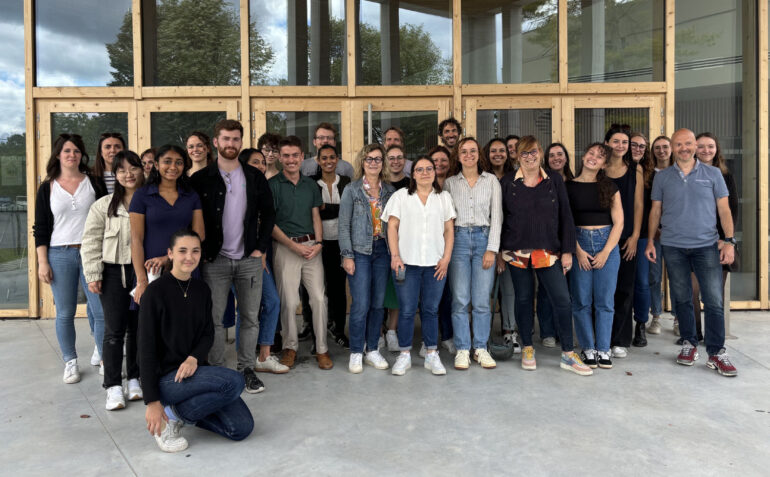Brain Nutrient Sensing and Cognitive Trajectory from Development to Aging (NutriMind)
The general objective of the NutriMind team is to understand how food-derived molecules including nutrients, micronutrients, odorant molecules and bioactive metabolites from the gut microbiota influence neuroimmune interactions and neuronal networks and affect cognitive, emotional and feeding behaviors. To understand the basics of brain nutrient-sensing, we apply translational and integrative approaches ranging from in vitro human and murine iPSC-derived neurons and microglia, ex/in vivo behavioral, electrophysiological, imaging, cellular and molecular approaches using nutritional and transgenic mice models, to human clinic by the collection of dietary supplemented human cohorts including molecular, cellular and cognitive evaluations. These knowledge aim at developing nutrient-based nutritional strategies to prevent and/or delay cognitive dysfunctions in a strategy of personalized nutrition. Our main objectives are to:
1) Elucidate molecular and cellular mechanisms underlying the behavioral effect of polyunsaturated fatty acids (PUFAs) and their metabolites (oxylipins, ethanolamides), vitamin A, polyphenols, fructose, odorant food-related molecules, microbiota-derived metabolites and complex food molecules
2) Depict the neurobiological mechanisms of altered feeding behaviors in the context of unbalanced nutrition
3) Depict neuroimmune interactions, microglia profile and activity in the developing and aging brain in controlled nutritional conditions
4) Define neuroprotective mechanisms of food-derived molecules on aging-associated cognitive decline in preclinical models
5) Define food-derived molecules-based strategies to prevent/delay aging-associated cognitive decline and neurodevelopmental disorders in humans
The discovery of the mechanisms underlying the detrimental or protective effect of nutrition on brain development and aging will allow : to identify new biomarkers for stratification of subjects at risk of neurodevelopmental disorders or cognitive decline; to define novel protective and therapeutic strategies including nutritional and nutrient specific interventions for personalized nutrition; to generate unbiased data for dietary recommendation for the promotion of an healthy brain development and aging; to understand how nutrients/odorant molecules contribute to the regulation of the neurobiology of food intake.
Mots clés
Selected publications
-
The microbiota restrains neurodegenerative microglia in a model of amyotrophic lateral sclerosis
Laura M. Cox, Narghes Calcagno, Christian Gauthier, Charlotte Madore, Oleg Butovsky, Howard L. Weiner.
Microbiome. 2022-03-11. 10 (1)
DOI: 10.1186/s40168-022-01232-z -
The gliotransmitter ACBP controls feeding and energy homeostasis via the melanocortin system
Khalil Bouyakdan, Hugo Martin, Fabienne Liénard, Lionel Budry, Bouchra Taib, Demetra Rodaros, Chloé Chrétien, Éric Biron, Zoé Husson, Daniela Cota, Luc Pénicaud, Stephanie Fulton, Xavier Fioramonti, and Thierry Alquier.
J Clin Invest. 2019-04-02.
DOI: 10.1172/JCI123454 -
Fish Hydrolysate Supplementation Containing n-3 Long Chain Polyunsaturated Fatty Acids and Peptides Prevents LPS-Induced Neuroinflammation.
Mathilde Chataigner, Marie Martin, Céline Lucas, Veronique Pallet, Sophie Layé, Alexis Mehaignerie, Elodie Bouvret, Anne-Laure Dinel, Corinne Joffre.
Nutrients. 2021-03-02. 13 (3) : 824.
DOI: 10.3390/nu13030824 -
Dietary fish hydrolysate supplementation containing n-3 LC-PUFAs and peptides prevents short-term memory and stress response deficits in aged mice
M. Chataigner, P. Mortessagne, C. Lucas, V. Pallet, S. Layé, A. Mehaignerie, E. Bouvret, AL. Dinel, C. Joffre.
Brain, Behavior, and Immunity. 2020-09-01.
DOI: 10.1016/j.bbi.2020.09.022 -
n-3 Polyunsaturated Fatty Acids and Their Derivates Reduce Neuroinflammation during Aging
Corinne Joffre, Anne-Laure Dinel, Mathilde Chataigner, Véronique Pallet, Sophie Layé.
Nutrients. 2020-02-28. 12 (3) : 647.
DOI: 10.3390/nu12030647 -
Inhibition of colony stimulating factor 1 receptor corrects maternal inflammation-induced microglial and synaptic dysfunction and behavioral abnormalities.
Seiko Ikezu, Hana Yeh, Jean-Christophe Delpech, Maya E. Woodbury, Alicia A. Van Enoo, Zhi Ruan, Sudhir Sivakumaran, Yang You, Carl Holland, Teresa Guillamon-Vivancos, Asuka Yoshii-Kitahara, Mina B. Botros, Charlotte Madore, Pin-Hao Chao, Ankita Desani, Solaiappan Manimaran, Srinidhi Venkatesan Kalavai, W. Evan Johnson, Oleg Butovsky, Maria Medalla, Jennifer I. Luebke, Tsuneya Ikezu.
Mol Psychiatry. 2020-02-18.
DOI: 10.1038/s41380-020-0671-2 -
Essential omega-3 fatty acids tune microglial phagocytosis of synaptic elements in the developing brain
C. Madore, Q. Leyrolle, L. Morel, J.C. Delpech, A.D. Greenhalgh, C. Lacabanne, C. Bosch-Bouju, J. Bourel, A. Thomazeau, K.E. Hopperton, S. Beccari, A. Sere, A. Aubert, V. De Smedt-Peyrusse, C. Lecours, K. Bisht, L. Fourgeaud, S. Gregoire, L. Bretillon, N. J. Grant, J. Badaut, P. Gressens, A. Sierra, O. Butovsky, M.E. Tremblay, R.P. Bazinet, C. Joffre, A. Nadjar, S. Layé.
. 2019-09-04.
DOI: 10.1101/744136 -
Maternal high fat high sugar diet disrupts olfactory behavior but not mucosa sensitivity in the offspring
Laëtitia Merle, Ophélie Person, Pierre Bonnet, Stéphane Grégoire, Vanessa Soubeyre, Xavier Grosmaitre, David Jarriault.
Psychoneuroendocrinology. 2019-06-01. 104 : 249-258.
DOI: 10.1016/j.psyneuen.2019.02.005 -
Polyunsaturated fatty acids and their metabolites in brain function and disease
Richard P. Bazinet, Sophie Layé.
Nat Rev Neurosci. 2014-11-12. 15 (12) : 771-785.
DOI: 10.1038/nrn3820 -
Nutritional omega-3 deficiency abolishes endocannabinoid-mediated neuronal functions
Mathieu Lafourcade, Thomas Larrieu, Susana Mato, Anais Duffaud, Marja Sepers, Isabelle Matias, Veronique De Smedt-Peyrusse, Virginie F Labrousse, Lionel Bretillon, Carlos Matute, Rafael Rodríguez-Puertas, Sophie Layé, Olivier J Manzoni.
Nat Neurosci. 2011-01-30. 14 (3) : 345-350.
DOI: 10.1038/nn.2736
Team member(s)
Chercheurs, Praticiens hospitaliers...
Jean-Christophe Delpech Delpech (Researcher)
Corinne Joffre Joffre (Researcher)
David Jarriault Jarriault (Researcher)
Anabelle Redonnet Redonnet (University Teacher- Researcher)
Véronique Pallet Pallet (University Teacher- Researcher)
Ingénieur(e)s, technicien(ne)s
Alexandra Séré Séré
Sarah Kharbouche Kharbouche
Juliette Dupont Dupont
Flavie Crespo Crespo
Maguelonne Peffaut De Latour Peffaut De Latour
Post-doctorant(s)
Liam Barry-Carroll Barry-Carroll
Adeline Crave Crave
Ludmila Troiano Troiano
Mathilde Huart Huart
Doctorant(s)
Ivan Marniquet Marniquet
Pauline Monguillon Monguillon
Louise Eygret Eygret
Emie Debenay Debenay
Anaïs Taoufik Taoufik
Yaeun Shim Shim
Marina Velotto Velotto
Neuropsychologist(s) and speech therapist(s)
Ingénieur(s) hospitalier(s) et ARC



